bill
Latest
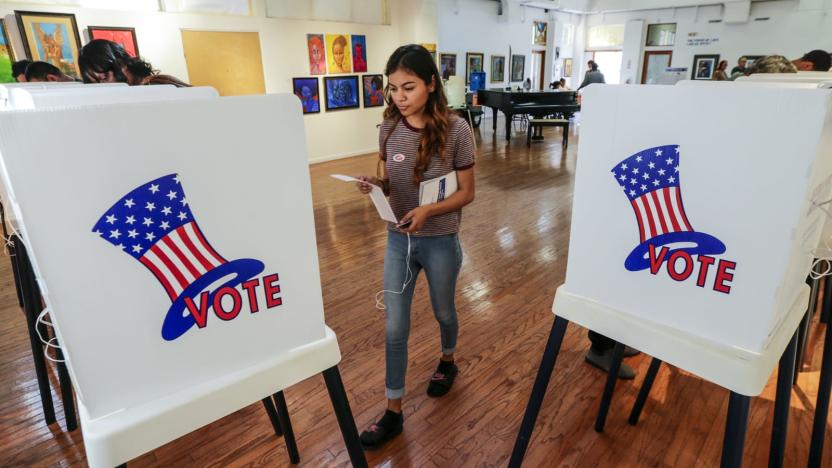
Senate bill would help guard against election hacks
American election security is a mess. Many voting systems are vulnerable, but replacing machines is expensive -- and then there's the lack of coordination between different levels of government. The country needs a lot of help if it's going to prevent a repeat of Russia's 2016 interference, let alone full-fledged tampering. Some new legislation might sort things out, however. A bipartisan group of senators has introduced the Secure Elections Act, a bill that would support state election systems with resources and expertise that could help fend off hacking attempts.

New York will tackle unfair biases in automated city services
Whether we're aware of them or not, algorithms affect a huge part of our lives. Now, in a US-first, New York is taking steps to address potential algorithmic biases in services provided by municipal agencies. City council has passed a bill that would -- if signed by Mayor de Blasio -- create a task force to examine if and how service algorithms are biased, how citizens can appeal decisions made by algorithms if they feel they're unfair, and if agency source code could be made publicly available.
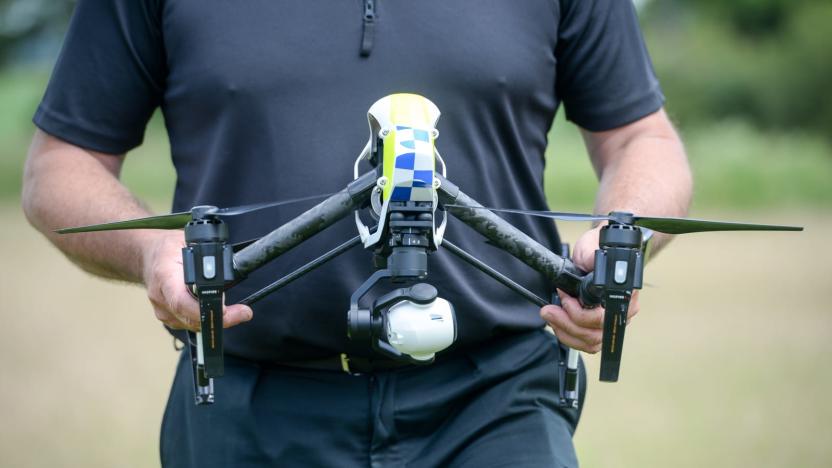
UK bill would give police the power to seize drones
The UK doesn't just want to institute rules governing how you fly your drone -- it wants to give police more power to take drones out of commission. A newly unveiled Drone Bill would give law enforcement the authority to order pilots to not only order operators to ground drones, but to seize drone parts if needed to prove that the machine was used to break the law. If someone's caught flying a drone over a prison, officers could both force the robotic flier down and confiscate it to illustrate what happened.

Internet giants now support bill to curb online sex trafficking
For ages, internet companies have fought changes to the Communications Decency Act's Section 230, which protects them from liability for content that might pass through their websites. They don't want to be sued because someone conducted sex trafficking on their sites without their knowledge. They've had a change of heart, though. The Internet Association (which includes Amazon, Facebook and Google) now supports the proposed Stop Enabling Sex Traffickers Act, which would explicitly punish online sites that facilitate exploitation, after lawmakers altered the bill to protect innocent sites against criminal charges and lawsuits.

Brazil softens ride-hailing bill after talks with Uber
It sounds like Dara Khosrowshahi's willingness to compromise with local authorities worked for Uber in Brazil. The ride-hailing firm's new chief has successfully convinced Brazilian officials to get rid of the strictest rules in the country's proposed legislation for ride-hailing services. Brazil originally wanted to require Uber drivers to apply for licenses with local municipalities to be able to use red number plates meant for public transport vehicles in country. In addition, authorities wanted to require Uber drivers to own the car they're driving. The drivers are still subject to local authorities' licensing and tax rules, but lawmakers ended up approving a more lenient version of the bill without the stipulations mentioned above.

Senate bill calls for free credit freezes after Equifax breach
US Senator Elizabeth Warren and a handful of her Democratic peers have introduced a bill intended to give consumers more control over the information collected by credit-reporting agencies including Equifax, TransUnion and Experian. The Freedom From Equifax Exploitation Act is in response to a massive security breach at Equifax that compromised the personal information of 143 million people. Equifax reported the hack on September 7th, though the attack itself was live from mid-May through the end of July.
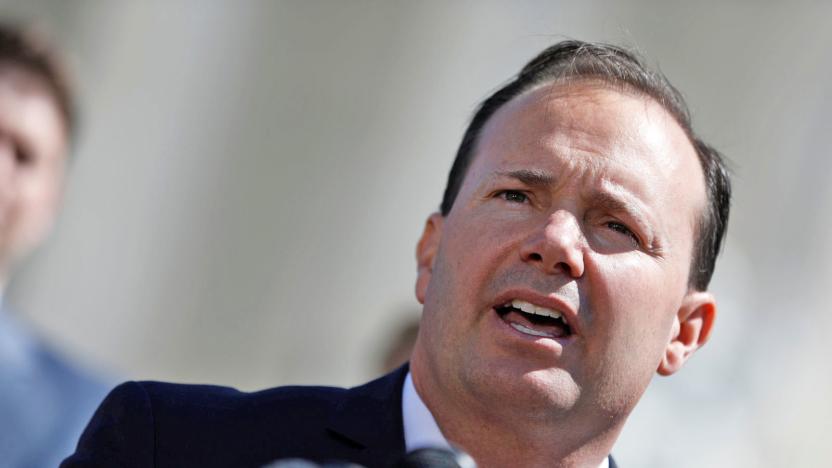
Bipartisan Senate legislation would modernize digital privacy
A group of senators introduced two bills today to modernize digital privacy. The current federal statutes derive from the Electronics Communication Privacy Act (ECPA), which was passed in 1986. One of their big motions extended phone wiretap laws to include communications between computers -- but a lot has changed in the last 30 years, and the bills want to bring American law up to date.

Facebook: German bill isn't 'suitable' to fight hate speech
Germany says sites like Facebook and Twitter aren't doing enough to combat hate speech and fake news on their platforms. The country's Ministry of Justice proposed a bill that, if approved, would fine social networks and other websites up to 50 million euros ($53 million) if they don't remove the content quickly. Well, Facebook says the Network Enforcement Act (Netzwerkdurchsetzungsgesetz or NetzDG in German) in its current form is "not suitable to combat hate speech and false news."

Congressional internet privacy bill would counter FCC rollbacks
The US House of Representatives may have voted to roll back the FCC's privacy rules and let internet providers sell your browser history without your explicit permission, but there's a proper replacement waiting in the wings... maybe. Tennessee Representative Marsha Blackburn has proposed a bill, the Browser Act, that would have both internet providers and content providers (like Facebook or Google) get your permission before selling data. They couldn't refuse service if you disagreed, either. The measure would theoretically please both privacy advocates as well as those telecoms that saw the FCC's ISP-only regulation as unfair, such as AT&T. However, there are still serious areas of concern -- it's possible that this bill would anger both sides.
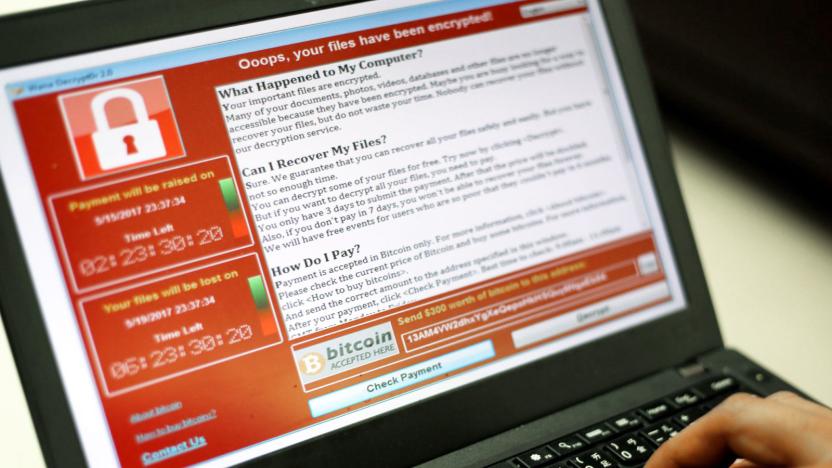
NSA would have to disclose its cyber exploit policies under new bill
It wasn't long after last week's devastating international ransomware attack before details surfaced about how the hackers found the exploit to target: It was stolen from the NSA, which stockpiles the digital vulnerabilities. Now, Democratic Senator Brian Schatz (HI) has introduced a bill that would create policy regulating how and when federal agencies would disclose known attack vectors.

Senate bill would make it harder to delete government data
It has only been a bit over 100 days, but the Trump administration is already known for making previously available date harder to find. Within just one month, it not only decided to hide the White House's visitor logs, but also to shutter the Open.gov portal that contains the White House staff's finances and other info. To make it harder for this administration and future ones to hide data and pull info that's already out there, Senators Gary Peters and Cory Gardner have introduced a bipartisan bill aptly called Preserving Government Data Act of 2017.

'Left 4 Dead' character returns to haunt 'Dead by Daylight'
Dead by Daylight, the hit survival-horror game that pits a team of four players against a dangerous killer, is getting a new character as part of the title's free "Left Behind" DLC. Players of Valve's successful Left 4 Dead series of zombie games will recognize Bill, the bearded, loyal-to-a-fault Vietnam vet as a new Dead by Daylight playable character.

UK government finally draws up laws for autonomous cars
Ever since the idea of autonomous vehicles began appearing on the roadmaps of major car makers, the UK government has made it clear that Britain can provide a strong platform for them to develop and test what they've built. Some projects, like the Lutz Pathfinder pod, are already underway, but questions have remained over who will be liable when autonomous modes are engaged on public roads. The 2016 Queen's Speech included a "Modern Transport Bill" that set out what needed to be done to support the introduction of driverless cars in the coming years. The document, which called for new and updated legislation, has now been worked on and finalised as the Vehicle Technology and Aviation Bill. In it, the government lists a number of proposals regarding how self-driving cars should be insured and suggests new rules requiring petrol stations (like Shell) and businesses to install more charging points for electric and hydrogen-powered cars. Most importantly, the government says insurance for autonomous vehicles in the UK will need to cover when the driver is in manual control and when the car is driving itself. It has been suggested that insurers will act as a middleman for manufacturers so that anyone injured by an autonomous car can claim against the owner's insurance and not have to file a private liability claim against the car maker. "This will mean innocent victims involved in a collision with an automated vehicle will have quick and easy access to compensation," the government said in a statement. The Bill also lays out instances where the owner will be at fault, even after engaging autonomous mode. If the owner has decided to modify the software on their vehicle or has failed to install important updates when their policy instructs them to, they will be made liable for any damages. It'll be down to the Secretary of State, by way of the Department for Transport, to decide which cars are covered by the new laws. "Automated vehicles have the potential to transform our roads in the future and make them even safer and easier to use, as well as promising new mobility for those who cannot drive," said Transport Secretary Chris Grayling. "We must ensure the public is protected in the event of an incident and today we are introducing the framework to allow insurance for these new technologies." To better assist the rising numbers of electric cars, the Vehicle Technology and Aviation Bill includes measures to increase the number of charging stations, but also force businesses to provide easy access to information regarding their location, hours of operation, fuelling options, cost (and methods of payment), charging methods (Tesla uses a different connector to Nissan, for example) and whether they are in use. Petrol stations and large businesses like supermarkets would be urged to provide points under the new proposals. Although true driverless cars are perhaps a few years away, the government believes that by acting quickly, car makers and developers of driverless technology will position the UK a leader in autonomous transportation. The Bill will now pass through Parliament, where ministers and third parties like insurers and vehicle makers can share their thoughts on how the UK's autonomous infrastructure should be built and maintained.

Obama signs bill to fund 'Moonshot' research to cure cancer
Several months after President Obama laid out his plans to cure cancer in his last State of the Union address, he is signing legislation to do just that. Known as the 21st Century Cures Act, the bill will invest $1.8 billion in a Cancer Moonshot Task Force led by Vice President Joe Biden that aims to achieve a decade's worth of research in just five years. In so doing, the team hopes to ramp up science and technological progress to the point where a cure for cancer can be found. "We are bringing to reality the possibility of new breakthroughs to some of the biggest health challenges of our time," said Obama in a ceremony today. "We're tackling cancer, brain disease, substance abuse disorders and more, and none of this would have been possible without bipartisan cooperation from both houses of Congress." The overall bill plans $6.3 billion to not just tackle cancer research but also brain research, substance abuse prevention and to streamline drug and medical device approval.

California bill would require more zero-emissions cars
California's tougher-than-usual climate change policy might become more stringent before long. Assemblywoman Autumn Burke tells the Associate Press that she's introducing a bill requiring that car manufacturers sell at least 15 percent zero-emissions free vehicles within a decade. Companies operating in the state already have to hit yearly emissions targets and get credits for sales, but this would require that they embrace electric or hydrogen fuel cell cars in a big way -- not just one or two novelty models. And if they don't sell enough eco-friendly cars, they'd have to either pay a fine to the state or pay rivals that meet the targets. Yes, they might inadvertently help the competition.

New York bill would ban 'Pokémon Go' stops near sex offenders
New York state might not just ban sex offenders from playing games like Pokémon Go -- it may eliminate the incentives for them to play, too. A group of senators have introduced a bill that would prevent augmented reality game developers from placing objectives (such as pokéstops) within 100 feet of where a registered sex offender lives. Companies that don't heed the warning could face fines of up to $100 per day for every location that violates the legislation.

US Congresswoman proposes federal revenge porn bill
Representative Jackie Speier has formally introduced a bill that would make revenge porn a federal crime. The Intimate Privacy Protection Act targets both those who share sexually explicit images without the subject's consent and those who profit from the act. It classifies the distribution of nonconsensual porn as a privacy violation than as harassment, because it also intends to protect people whose sensitive images are maliciously distributed by medical professionals and law enforcement. If it becomes a law, anyone found guilty of breaking it would either have to pay a fine or spend up to five years in prison, depending on the details of the crime.

Senate approves national GMO labeling standard
The Senate has voted 63-30 in favor of a bill that would enforce a GMO labeling standard for the whole country. If it passes, food manufacturers would be required to disclose genetically modified ingredients in their products through a label on an item's packaging. It doesn't mean bad news for those manufacturers, though -- in fact, the bill's requirements work in their favor. A more stringent GMO labeling law went into effect in Vermont on July 1st, and food companies were unhappy because it could lead to different laws per state that would be a nightmare to implement.
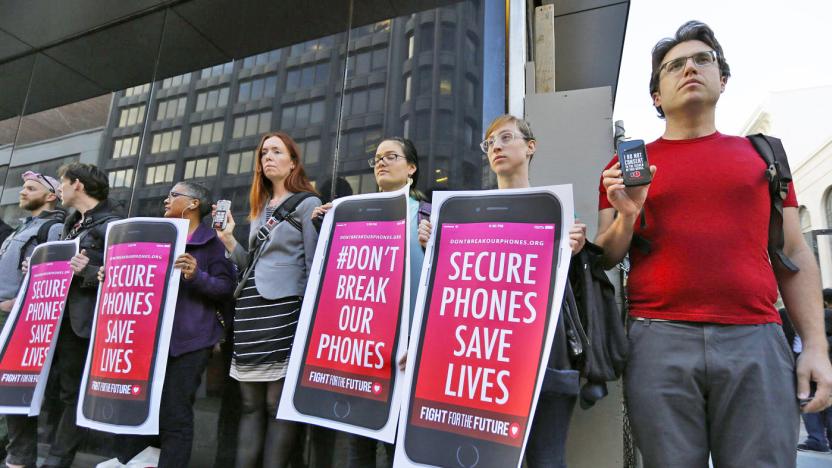
Senate anti-encryption bill is effectively dead, for now
If you were worried that a possible Senate bill requiring encryption backdoors would get enough support to become law, you can relax... for a while, at least. Reuters' government tipsters claim that the proposal, drafted by Senators Richard Burr and Dianne Feinstein, has lost most of its support. It won't be introduced this year, the insiders say, and would have no real chance even if it did go up for a vote. The White House's reluctance to back the bill (in public, anyway) is the main factor, but even the CIA and NSA were "ambivalent" knowing that it could hurt their own encryption.

The President says he will veto anti-net neutrality bill
President Obama swears that H.R. 2666 will never become a law under his administration. In a letter published today, the White House says the bill "would undermine key provisions in the Federal Communications Commission's (FCC) Open Internet order." The president's advisors would recommend that he veto it if it ever reaches his office. H.R. 2666 also known as the "No Rate Regulation of Broadband Internet Access Act" looks like it complements the FCC's new net neutrality rules at first glance. It wants to make sure that the FCC can't regulate broadband rates -- something that commission chairman Tom Wheeler promised his office won't do -- after all.








